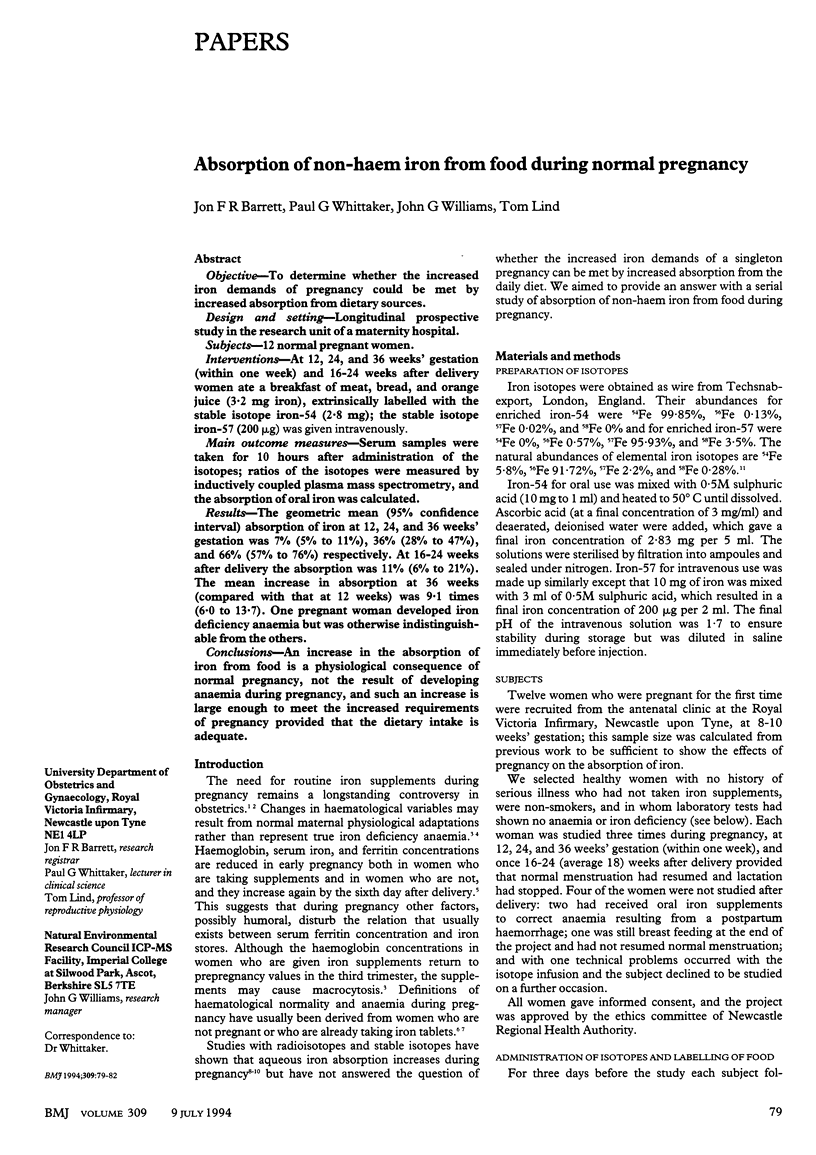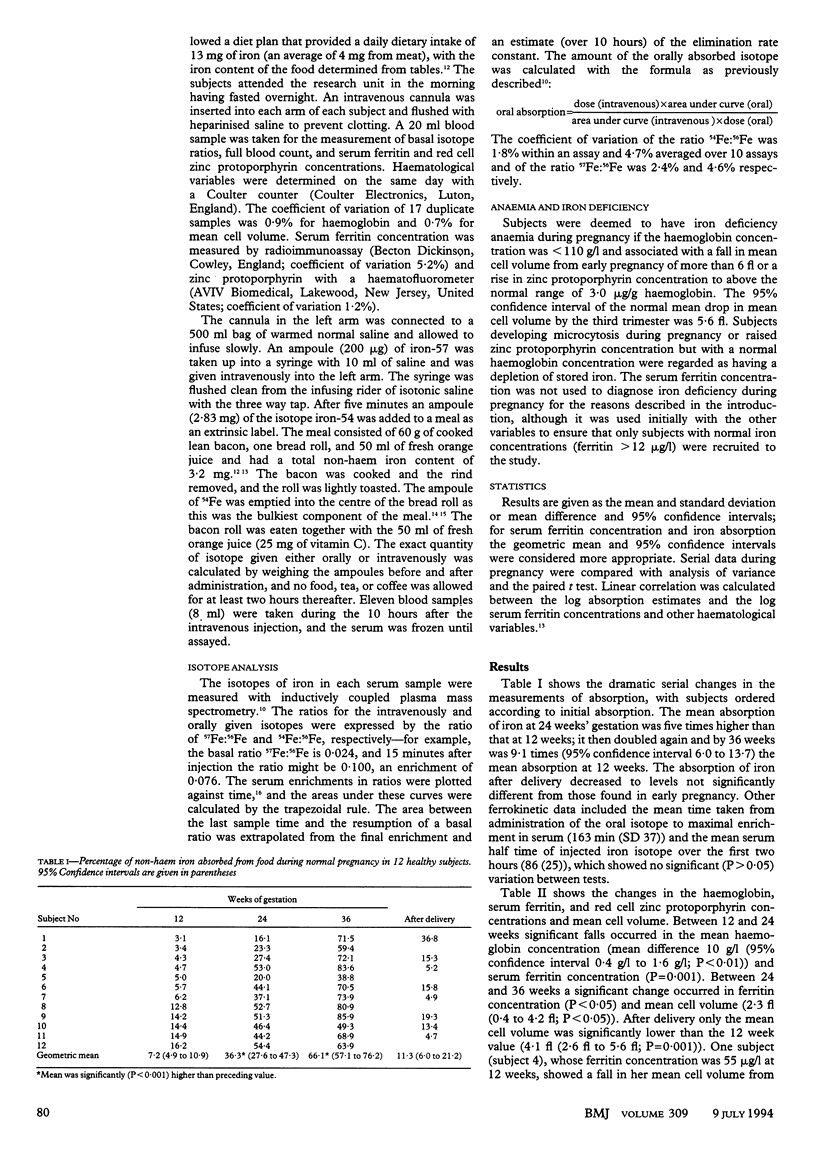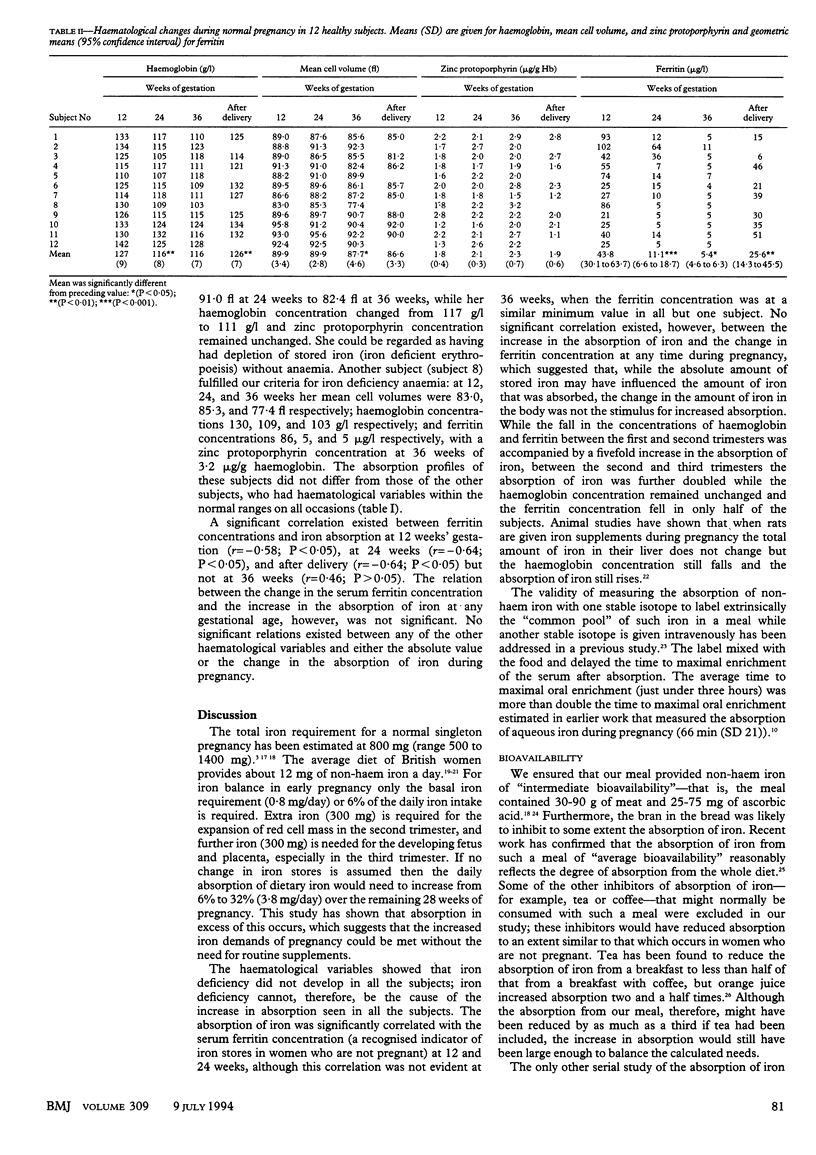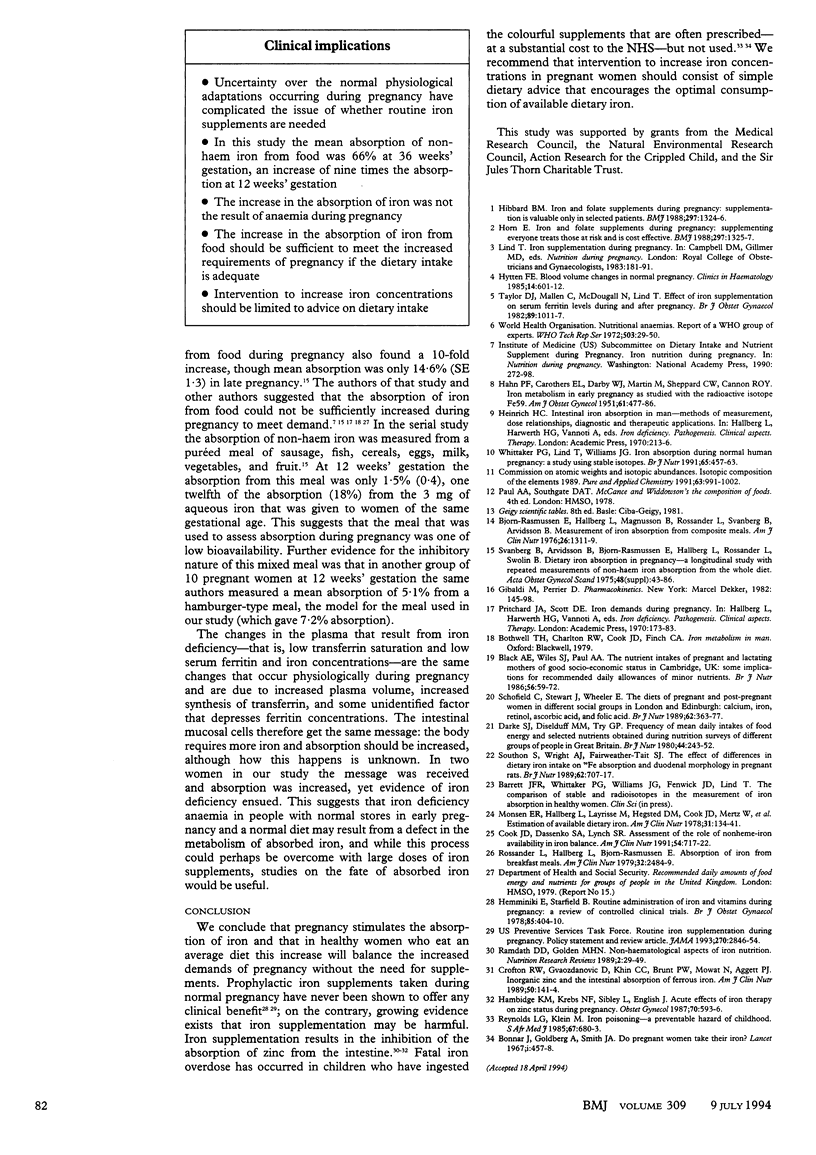Abstract
OBJECTIVE--To determine whether the increased iron demands of pregnancy could be met by increased absorption from dietary sources. DESIGN AND SETTING--Longitudinal prospective study in the research unit of a maternity hospital. SUBJECTS--12 normal pregnant women. INTERVENTIONS--At 12, 24, and 36 weeks' gestation (within one week) and 16-24 weeks after delivery women ate a breakfast of meat, bread, and orange juice (3.2 mg iron), extrinsically labelled with the stable isotope iron-54 (2.8 mg); the stable isotope iron-57 (200 micrograms) was given intravenously. MAIN OUTCOME MEASURES--Serum samples were taken for 10 hours after administration of the isotopes; ratios of the isotopes were measured by inductively coupled plasma mass spectrometry, and the absorption of oral iron was calculated. RESULTS--The geometric mean (95% confidence interval) absorption of iron at 12, 24, and 36 weeks' gestation was 7% (5% to 11%), 36% (28% to 47%), and 66% (57% to 76%) respectively. At 16-24 weeks after delivery the absorption was 11% (6% to 21%). The mean increase in absorption at 36 weeks (compared with that at 12 weeks) was 9.1 times (6.0 to 13.7). One pregnant woman developed iron deficiency anaemia but was otherwise indistinguishable from the others. CONCLUSIONS--An increase in the absorption of iron from food is a physiological consequence of normal pregnancy, not the result of developing anaemia during pregnancy, and such an increase is large enough to meet the increased requirements of pregnancy provided that the dietary intake is adequate.
Full text
PDF



Selected References
These references are in PubMed. This may not be the complete list of references from this article.
- Black A. E., Wiles S. J., Paul A. A. The nutrient intakes of pregnant and lactating mothers of good socio-economic status in Cambridge, UK: some implications for recommended daily allowances of minor nutrients. Br J Nutr. 1986 Jul;56(1):59–72. doi: 10.1079/bjn19860085. [DOI] [PubMed] [Google Scholar]
- Bonnar J., Goldberg A., Smith J. A. Do pregnant women take their iron? Lancet. 1969 Mar 1;1(7592):457–458. doi: 10.1016/s0140-6736(69)91492-5. [DOI] [PubMed] [Google Scholar]
- Cook J. D., Dassenko S. A., Lynch S. R. Assessment of the role of nonheme-iron availability in iron balance. Am J Clin Nutr. 1991 Oct;54(4):717–722. doi: 10.1093/ajcn/54.4.717. [DOI] [PubMed] [Google Scholar]
- Crofton R. W., Gvozdanovic D., Gvozdanovic S., Khin C. C., Brunt P. W., Mowat N. A., Aggett P. J. Inorganic zinc and the intestinal absorption of ferrous iron. Am J Clin Nutr. 1989 Jul;50(1):141–144. doi: 10.1093/ajcn/50.1.141. [DOI] [PubMed] [Google Scholar]
- HAHN P. F., CAROTHERS E. L., DARBY W. J., MARTIN M., SHEPPARD C. W., CANNON R. O., BEAM A. S., DENSEN P. M., PETERSON J. C., McCLELLAN G. S. Iron metabolism in human pregnancy as studied with radioactive isotope, Fe59. Am J Obstet Gynecol. 1951 Mar;61(3):477–486. doi: 10.1016/0002-9378(51)91394-4. [DOI] [PubMed] [Google Scholar]
- Hambidge K. M., Krebs N. F., Sibley L., English J. Acute effects of iron therapy on zinc status during pregnancy. Obstet Gynecol. 1987 Oct;70(4):593–596. [PubMed] [Google Scholar]
- Hemminki E., Starfield B. Routine administration of iron and vitamins during pregnancy: review of controlled clinical trials. Br J Obstet Gynaecol. 1978 Jun;85(6):404–410. doi: 10.1111/j.1471-0528.1978.tb14905.x. [DOI] [PubMed] [Google Scholar]
- Hibbard B. M. Iron and folate supplements during pregnancy: supplementation is valuable only in selected patients. BMJ. 1988 Nov 19;297(6659):1324–1326. doi: 10.1136/bmj.297.6659.1324. [DOI] [PMC free article] [PubMed] [Google Scholar]
- Horn E. Iron and folate supplements during pregnancy: supplementing everyone treats those at risk and is cost effective. BMJ. 1988 Nov 19;297(6659):1325–1327. doi: 10.1136/bmj.297.6659.1325. [DOI] [PMC free article] [PubMed] [Google Scholar]
- Hytten F. Blood volume changes in normal pregnancy. Clin Haematol. 1985 Oct;14(3):601–612. [PubMed] [Google Scholar]
- Monsen E. R., Hallberg L., Layrisse M., Hegsted D. M., Cook J. D., Mertz W., Finch C. A. Estimation of available dietary iron. Am J Clin Nutr. 1978 Jan;31(1):134–141. doi: 10.1093/ajcn/31.1.134. [DOI] [PubMed] [Google Scholar]
- Reynolds L. G., Klein M. Iron poisoning--a preventable hazard of childhood. S Afr Med J. 1985 Apr 27;67(17):680–683. [PubMed] [Google Scholar]
- Rossander L., Hallberg L., Björn-Rasmussen E. Absorption of iron from breakfast meals. Am J Clin Nutr. 1979 Dec;32(12):2484–2489. doi: 10.1093/ajcn/32.12.2484. [DOI] [PubMed] [Google Scholar]
- Schofield C., Stewart J., Wheeler E. The diets of pregnant and post-pregnant women in different social groups in London and Edinburgh: calcium, iron, retinol, ascorbic acid and folic acid. Br J Nutr. 1989 Sep;62(2):363–377. doi: 10.1079/bjn19890037. [DOI] [PubMed] [Google Scholar]
- Southon S., Wright A. J., Fairweather-Tait S. J. The effect of differences in dietary iron intake on 59Fe absorption and duodenal morphology in pregnant rats. Br J Nutr. 1989 Nov;62(3):707–717. doi: 10.1079/bjn19890071. [DOI] [PubMed] [Google Scholar]
- Svanberg B., Arvidsson B., Björn-Rasmussen E., Hallberg L., Rossander L., Swolin B. Dietary iron absorption in pregnancy - a longitudinal study with repeated measurements of non-haeme iron absorption from whole diet. Acta Obstet Gynecol Scand Suppl. 1975;48:43–68. doi: 10.3109/00016347509156330. [DOI] [PubMed] [Google Scholar]
- Whittaker P. G., Lind T., Williams J. G. Iron absorption during normal human pregnancy: a study using stable isotopes. Br J Nutr. 1991 May;65(3):457–463. doi: 10.1079/bjn19910104. [DOI] [PubMed] [Google Scholar]


